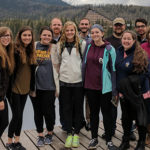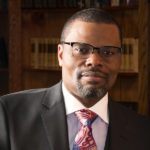Don Newbury was the president of Howard Payne University from 1986 to 1997 and chancellor of HPU from 1997 to 2000. He still holds the honorary title of chancellor. From deep in the heart of one Texan, Newbury shares his background and thoughts on Christian higher education. To suggest a Baptist General Convention of Texas-affiliated leader to be featured in this column, or to apply to be featured yourself, click here.
Background
Where did you grow up?
I was born at home a few miles west of May in Brown County and attended all 12 grades in Early Public Schools outside Brownwood.
Where were you educated?
I received a Bachelor of Arts degree from Howard Payne University, a Master of Journalism degree from the University of Texas-Austin and a Ph.D. in higher education administration from the University of North Texas.
In addition to your most-noted position, where else did you serve in ministry?
• Sports information director, HPU, starting in 1957.
• Instructor of journalism, HPU, 1961 to 1963.
• Instructor of journalism and director of college information, Sul Ross State University, Alpine, 1963 to 1967.
• Public relations director, Tarrant County Junior College, Fort Worth, 1967 to 1980.
• President, Western Texas College, Snyder, 1981 to 1985.
When did you retire from Howard Payne?
I retired from HPU in 2000, but I still try to be helpful as a volunteer.
How have you occupied yourself since then?
I have remained active in retirement, writing a weekly column of humor and inspiration that runs in almost 200 newspapers, largely in Texas, and authoring several books. I’m also in my fourth year working part-time with senior adults at First Baptist Church of Burleson, where we live.
How did you come to faith in Christ?
I came to faith in Christ at about age 9. My parents were pretty spasmodic about church attendance, but I felt Jesus’ call and responded during revival meeting at Blanket Methodist Church in rural Brown County.
My conversion experience led to more regular church attendance by my family, which by 1946 included my younger brother, and involvement in youth activities with Methodist Youth Fellowship.
Why did you feel called into ministry?
This was a fairly extended process. Upon college graduation in 1961, I felt ready to accept a sports writing assignment. I was high-minded, thinking I’d become a Blackie Sherrod. I was a bit jarred to learn starting salaries in the sports writing world and decided to stay on at HPU for a couple of years, since I also was a newspaper correspondent at the time, as well as the so-called “sports director” at a local radio station.
Sign up for our weekly edition and get all our headlines in your inbox on Thursdays
Altogether, income was modest but acceptable, and I remained living at home. At about age 25, I was a candidate for a sports information job at Lamar Tech and a college information job at Sul Ross. I felt Sul Ross was the best opportunity, though with a much heavier workload. Indeed, it was a great choice. I met Brenda, my eventual wife and a student there at the time. We have been married 54 years.
When Tarrant County Junior College became a reality in 1966, I was approached about being director of community relations. This seemed like a good move—and was—since I would have opportunity to work on doctorates at the University of North Texas.
I reported directly to CEO Joe Rushing, and I saw pretty much firsthand how academe needed to work. I felt largely committed to public relations and kidded about why anyone would want to be a college president.
When we moved to Snyder in 1980, it seemed a good fit for my family and me. It was a small town where our three young daughters could be reared with church, schools and community all in close proximity.
The same opportunities were appreciated in Brownwood, where I was named HPU president in December 1985. In matters financial, this was a lateral move, but we felt it important to take this step, acknowledging considerable faith as we made the step, knowing the way would be difficult but hopefully fulfilling. It was.
About academic life
What was your favorite or most joyful aspect of higher education? Why?
I loved watching young people grow into roles of service as responsible adults. I also enjoyed working as part of a team to restore HPU enrollment, which almost doubled to about 1,400 students during my tenure.
What part of higher education delivered the greatest heartache or headache?
Never having enough resources to avoid tuition increases annually. Thankfully, I believe the corner has been turned by many institutions on this topic.
What element of higher education do you wish you could have changed?
Painful denominational upheaval. It has greatly reduced financial assistance by the Baptist General Convention of Texas to its member universities, probably by about 50 percent.
What would you tell the young you, just starting out in higher education?
To expect change and to embrace the part of it that does not require compromise. Expect to relocate several times. And pursue higher education from accredited institutions only.
About Don
Why are you a Baptist?
Probably by merger. My parents were Methodist, as I was during youth and until about age 30. I met and married Brenda during my time at Sul Ross University. She was a member of the Assembly of God church.
We agreed to be in the same church upon marriage and settled on the Baptist church, largely because of my positive experiences as a student and later as a faculty member at Howard Payne, which I often said to be a place where “we try to make everyone Christians and Baptists better ones.”
Who were/are your mentors, and how did/do they influence you?
I excelled in most subjects, but certainly not algebra. O.B. Chambers, superintendent and algebra teacher at Early Schools, suggested to me often: “Don’t try to change it; try to understand it.”
Guy D. Newman, HPU president during my student years and one of my biggest cheer leaders upon my return there as president, had a great influence on me. It was my pleasure to restore his status as chancellor—albeit honorary, like mine.
Cecil Holman, a longtime undertaker with had a funeral home and grocery store in Brownwood used by people of color during my growing-up years, didn’t finish high school but was as wise as any person I’ve ever known. I spent many evenings watching him deal with people frequenting his store, often without money to pay. He’d charge their goods on a spiral pad.
Joe Rushing, founding CEO of Tarrant County Junior College and an HPU alum, was a great boss. I learned much from him about patience and not responding too soon to delicate situations. He said my job was to “keep TCJC in the news and off the front page.”
Other than the Bible, name some of your favorite books or authors, and explain why.
Erma Bombeck could extract more humor more often from everyday situations than any author before or since. She had kidney issues most of her adult life and refused to cut in line for a transplant that likely would have saved her life. A match became available within a few days of her death.
Also, George Dolan, a longtime front-page columnist for the Fort Worth Star-Telegram. His and Erma’s always clean humor humanized us all.
Who is your favorite person in the Bible, other than Jesus? Why?
The Apostle Paul. He was proof there’s forgiveness available for all who confess and serve Christ.
If you could get one “do over” in ministry, what would it be, and why?
I wish I had been more courageous on two fronts, the first of which I likely couldn’t get accomplished, even with gargantuan effort.
First, I’ve always believed there should be blank slates for youngsters who attend college for a semester, a year or longer and then drop out without dropping classes. Why should they receive a string of Fs for incompletes? Those grades often are haunting, even when those students “get serious” later—if they do. I also believe graduates in most programs should be extended grace in one required field where they seem most handicapped.
Second, I wish I had been more courageous at Western Texas College, where the men’s basketball team won the national championship one year before I arrived. Basketball was king in those days. I should have tried—though I may have failed—to de-emphasize winning somewhat. We had players from all over the nation, but never more than one or two from Texas—if that many. Taxpayers had every right to ask why youngsters from West Texas, or elsewhere in the state, couldn’t play. There was no good answer.
Along similar lines, I was one of the presidents who helped organize what is now the American Southwest Conference, whose member schools are in NCAA Division III. At the time, CEOs agreed we always would seek level playing fields. Boards should emphasize national championships are not to be sought, but instead should establish strong rules and concentrate generally on conference championships.
What might people not know about you?
Friends know my calling card was and still is popcorn I pop in a theatre-sized machine in our garage. My wife doesn’t like the “odor,” and I remind her it’s an “aroma.” I still give it away when I speak, and I’ve had the pleasure of speaking almost 6,000 times in 45 states for the past six decades. COVID has reduced invitations greatly, of course.
Not many people know that before the popcorn giveaways—some 27 tons—I gave away snow cones in the neighborhood when the girls were young. Neighbors would help by freezing ice in gallon jugs. So, it cost only about two cents each to give away the cones on hot summer nights.
Many may not know Brenda and I and five other couples bought a professional parasail boat for HPU. I went to Florida to learn how to drive it, and we used it dozens of times on Lake Brownwood for our students and prospective students. In the Gulf of Mexico, 1,200-foot ropes are used; at Lake Brownwood, 600-foot ropes seemed plenty high.














We seek to connect God’s story and God’s people around the world. To learn more about God’s story, click here.
Send comments and feedback to Eric Black, our editor. For comments to be published, please specify “letter to the editor.” Maximum length for publication is 300 words.